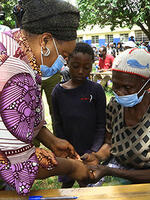Filter by...
Reset all
Publications (136)
Working Paper
pdf
This study explores the social protection and humanitarian emergency nexus in Zambia. Drawing on 25 stakeholder interviews and relevant literature sources, it seeks to (i) identify the social protection needs experienced in the country in the context of different shocks and crises; (ii) elucidate...
Working Paper
pdf
Raindrop in the drought? Vulnerability to climate shocks and the role of social protection in Zambia
Zambia’s reliance on rain-fed agriculture makes its economy and population highly vulnerable to frequent droughts and irregular rainfall. This paper assesses the role of social protection, specifically the Social Cash Transfer (SCT) program, in mitigating drought-induced poverty and consumption...
Working Paper
pdf
This paper exploits several waves of two major nationwide representative surveys to document the impacts of climate shocks on individuals and households in Zambia. We merge these datasets with historical precipitation and temperature data at the district level. First, we show the gendered effects of...
Working Paper
pdf
– Evidence from Zambia's formal sector
Low-income countries face the combined challenges of climate shocks and limited domestic revenue mobilization, yet these issues are rarely studied together. This paper provides new evidence on the impact of climate shocks on firm performance and tax revenue in a low-income country context, using...
Journal Article
– Insights from survey and tax administrative data in Zambia
This study examines how formal firms have been impacted by and recovered from the COVID-19 pandemic, by drawing on two distinct but complementary data sources. This is the first attempt to use both survey and tax administrative data to measure the impact of the pandemic in a developing country. The...
Journal Article
This peer-reviewed research is available free of charge. UNU-WIDER believes that research is a global public good and supports Open Access.
We investigate the behavioural responses of individual taxpayers to changes in marginal personal income tax rates applying empirical bunching methodology to tax administrative data from Zambia over the period from 2014 to 2021. We find evidence for excess bunching at the first kink in the tax...
Report
pdf
This report documents MicroZAMOD, the SOUTHMOD model developed for Zambia. This work was carried out by Zambia Institute for Policy Analysis & Research (ZIPAR) in collaboration with the project partners. The results presented in this report are derived using MicroZAMOD version 2.16, which is part of...
Working Paper
pdf
– Comparing the performance of universal basic income in Uganda and Zambia during COVID-19
The debate over universal basic income (UBI) has gained traction in the developing world in recent years. We analyse the effects of four UBI schemes on poverty and inequality measures during normal times and times of crisis in Uganda and Zambia. We use static microsimulation models and nationally...
Working Paper
pdf
This paper explores two policy interventions in Zambia, a minimum wage hike in 2018 and an upward revision in the first kink in the progressive income tax schedule in 2017, to examine and compare the impact of minimum wage and tax kink changes on wages and the earnings distribution in the formal and...

The Zambian government wants to reduce poverty by 20% by 2030. To make this happen, the government reformed their national cash transfer programmes. But what was the potential impact? In 2021, our MicroZAMOD team conducted an assessment—recommendations of which have been adopted at the highest level...
Working Paper
pdf
– Simulation results for Zambia
The COVID-19 pandemic increased public debt and changed the income distribution in many countries. We use a numerical simulation approach to derive optimal nonlinear marginal tax rates for the pre-crisis and crisis periods. We contribute to the literature by examining optimal tax rates numerically...
Working Paper
pdf
– Evidence from Zambian tax administrative data
We investigate the behavioural responses of individual taxpayers to changes in marginal personal income tax rates applying empirical bunching methodology to tax administrative data from Zambia over the period from 2014 to 2021. We find evidence for excess bunching at the first kink in the tax...
Working Paper
pdf
– A comparative perspective
We examine the distributional effects of the COVID-19 pandemic and associated tax-benefit measures in seven sub-Saharan African countries, focusing on the onset of the crisis.We evaluate impacts on disposable incomes, considering variations across income groups; assess the effectiveness of tax...

Across Kenya, Malawi, and Zambia, political candidates often attempt to buy the votes of the most socio-economically deprived communities. But new research from Prisca Jöst and Ellen Lust argues that social cohesion in these communities is instrumental in determining the levels of support for...
Report
pdf
This report documents MicroZAMOD, the SOUTHMOD model developed for Zambia. This work was carried out by Zambia Institute for Policy Analysis & Research (ZIPAR) in collaboration with the project partners. The results presented in this report are derived using MicroZAMOD version 2.15 running on...

Zambia is putting in place fiscal measures to improve the efficient collection of domestic revenue to finance social and public infrastructure. This analysis shows how much more revenue can be accumulated if tax evasion was at the bare minimum.Tax gap describes the share of the potential tax revenue...
Displaying 16 of 136 results
 Join the network
Join the network